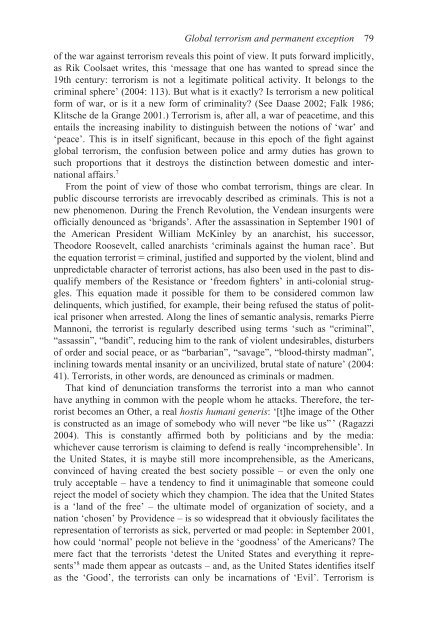The International Political Thought of Carl Schmitt: Terror, Liberal ...
The International Political Thought of Carl Schmitt: Terror, Liberal ...
The International Political Thought of Carl Schmitt: Terror, Liberal ...
You also want an ePaper? Increase the reach of your titles
YUMPU automatically turns print PDFs into web optimized ePapers that Google loves.
Global terrorism and permanent exception 79<br />
<strong>of</strong> the war against terrorism reveals this point <strong>of</strong> view. It puts forward implicitly,<br />
as Rik Coolsaet writes, this ‘message that one has wanted to spread since the<br />
19th century: terrorism is not a legitimate political activity. It belongs to the<br />
criminal sphere’ (2004: 113). But what is it exactly? Is terrorism a new political<br />
form <strong>of</strong> war, or is it a new form <strong>of</strong> criminality? (See Daase 2002; Falk 1986;<br />
Klitsche de la Grange 2001.) <strong>Terror</strong>ism is, after all, a war <strong>of</strong> peacetime, and this<br />
entails the increasing inability to distinguish between the notions <strong>of</strong> ‘war’ and<br />
‘peace’. This is in itself significant, because in this epoch <strong>of</strong> the fight against<br />
global terrorism, the confusion between police and army duties has grown to<br />
such proportions that it destroys the distinction between domestic and international<br />
affairs. 7<br />
From the point <strong>of</strong> view <strong>of</strong> those who combat terrorism, things are clear. In<br />
public discourse terrorists are irrevocably described as criminals. This is not a<br />
new phenomenon. During the French Revolution, the Vendean insurgents were<br />
<strong>of</strong>ficially denounced as ‘brigands’. After the assassination in September 1901 <strong>of</strong><br />
the American President William McKinley by an anarchist, his successor,<br />
<strong>The</strong>odore Roosevelt, called anarchists ‘criminals against the human race’. But<br />
the equation terrorist�criminal, justified and supported by the violent, blind and<br />
unpredictable character <strong>of</strong> terrorist actions, has also been used in the past to disqualify<br />
members <strong>of</strong> the Resistance or ‘freedom fighters’ in anti-colonial struggles.<br />
This equation made it possible for them to be considered common law<br />
delinquents, which justified, for example, their being refused the status <strong>of</strong> political<br />
prisoner when arrested. Along the lines <strong>of</strong> semantic analysis, remarks Pierre<br />
Mannoni, the terrorist is regularly described using terms ‘such as “criminal”,<br />
“assassin”, “bandit”, reducing him to the rank <strong>of</strong> violent undesirables, disturbers<br />
<strong>of</strong> order and social peace, or as “barbarian”, “savage”, “blood-thirsty madman”,<br />
inclining towards mental insanity or an uncivilized, brutal state <strong>of</strong> nature’ (2004:<br />
41). <strong>Terror</strong>ists, in other words, are denounced as criminals or madmen.<br />
That kind <strong>of</strong> denunciation transforms the terrorist into a man who cannot<br />
have anything in common with the people whom he attacks. <strong>The</strong>refore, the terrorist<br />
becomes an Other, a real hostis humani generis: ‘[t]he image <strong>of</strong> the Other<br />
is constructed as an image <strong>of</strong> somebody who will never “be like us” ’ (Ragazzi<br />
2004). This is constantly affirmed both by politicians and by the media:<br />
whichever cause terrorism is claiming to defend is really ‘incomprehensible’. In<br />
the United States, it is maybe still more incomprehensible, as the Americans,<br />
convinced <strong>of</strong> having created the best society possible – or even the only one<br />
truly acceptable – have a tendency to find it unimaginable that someone could<br />
reject the model <strong>of</strong> society which they champion. <strong>The</strong> idea that the United States<br />
is a ‘land <strong>of</strong> the free’ – the ultimate model <strong>of</strong> organization <strong>of</strong> society, and a<br />
nation ‘chosen’ by Providence – is so widespread that it obviously facilitates the<br />
representation <strong>of</strong> terrorists as sick, perverted or mad people: in September 2001,<br />
how could ‘normal’ people not believe in the ‘goodness’ <strong>of</strong> the Americans? <strong>The</strong><br />
mere fact that the terrorists ‘detest the United States and everything it represents’<br />
8 made them appear as outcasts – and, as the United States identifies itself<br />
as the ‘Good’, the terrorists can only be incarnations <strong>of</strong> ‘Evil’. <strong>Terror</strong>ism is
















